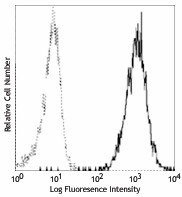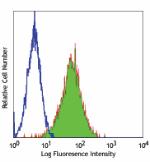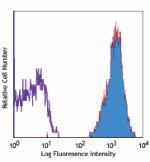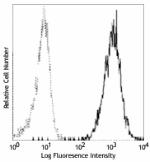- Clone
- RMT1-4 (See other available formats)
- Regulatory Status
- RUO
- Other Names
- T cell immunoglobulin and mucin domain containing protein-1, T cell and airway phenotype regulator (Tapr), hepatitic virus cellular receptor 1, CD365
- Isotype
- Rat IgG2b, κ
- Ave. Rating
- Submit a Review
- Product Citations
- 8 publications

| Cat # | Size | Price | Quantity Check Availability | Save | ||
|---|---|---|---|---|---|---|
| 119505 | 50 µg | $131 | ||||
| 119506 | 200 µg | $408 | ||||
CD365 (Tim-1) is a transmembrane protein also known as T cell immunoglobulin and mucin domain containing protein-1 and hepatitis virus cellular receptor 1. It is developmentally expressed at high levels in the blastocyst. Tim-1 is expressed on activated CD4+ lymphocytes especially on Th2 cells and has been implicated to play a critical role in the development of atopic disease and other Th2-biased immune responses. Tim-1 is hepatitis A virus receptor in humans. Tim-4 is the endogenous ligand of Tim-1. The interaction of Tim-1 and Tim-4 is involved in costimulation of T cell proliferation. Tim-1 is an endogenous ligand for LMIR5/CD300b.
Product DetailsProduct Details
- Verified Reactivity
- Mouse
- Antibody Type
- Monoclonal
- Host Species
- Rat
- Formulation
- Phosphate-buffered solution, pH 7.2, containing 0.09% sodium azide.
- Preparation
- The antibody was purified by affinity chromatography, and conjugated with PE under optimal conditions.
- Concentration
- 0.2 mg/ml
- Storage & Handling
- The antibody solution should be stored undiluted between 2°C and 8°C, and protected from prolonged exposure to light. Do not freeze.
- Application
-
FC - Quality tested
- Recommended Usage
-
Each lot of this antibody is quality control tested by immunofluorescent staining with flow cytometric analysis. For flow cytometric staining, the suggested use of this reagent is ≤ 0.25 µg per 106 cells in 100 µl volume. It is recommended that the reagent be titrated for optimal performance in each application.
- Excitation Laser
-
Blue Laser (488 nm)
Green Laser (532 nm)/Yellow-Green Laser (561 nm)
-
Application References
(PubMed link indicates BioLegend citation) -
- Meyers JH, et al. 2005. Nat. Immunol. 6:455.
- Nakae S, et al. 2007. Blood doi:10.1182/blood-2006-11-058800.
- Yamanishi Y, et. al. 2010. J. Exp. Med. 207:1501. (FC)
- Namavari A, et al. 2012. Invest Ophthalmol Vis Sci. 53:4575. PubMed.
- Product Citations
-
- RRID
-
AB_2248167 (BioLegend Cat. No. 119505)
AB_2232887 (BioLegend Cat. No. 119506)
Antigen Details
- Structure
- Transmembrane protein containing immunoglobulin domain and mucin-like domain; predicted molecular weight 33 kD.
- Distribution
-
Developmentally regulated; highly expressed in embryonic development in blastocysts. Expressed on activated CD4+ lymphocytes, especially Th2 cell lines.
- Function
- Binds hepatitis virus, may play a critical role in immune responses and the development of atopic diseases (in particular airway hyperreactivity).
- Ligand/Receptor
- Binds hepatitis A virus in humans, Tim-4, LMIR5/CD300b
- Cell Type
- T cells, Th2
- Biology Area
- Immunology, Inhibitory Molecules
- Molecular Family
- CD Molecules
- Antigen References
-
1. McIntire JJ, et al. 2001. Nature Immunol. 2:1109.
2. Kuchroo VK, et al. 2003. Nat. Rev. Immunol. 3:454.
3. Wills-Karp M, et al. 2001. Nat. Rev. Immunol. 1:69.
4. Meyers JH, et al. 2005. Nat. Immunol. 6(5):455. - Gene ID
- 171283 View all products for this Gene ID
- UniProt
- View information about CD365 on UniProt.org
Related Pages & Pathways
Pages
Related FAQs
- What type of PE do you use in your conjugates?
- We use R-PE in our conjugates.
Other Formats
View All CD365 Reagents Request Custom Conjugation| Description | Clone | Applications |
|---|---|---|
| Purified anti-mouse CD365 (Tim-1) | RMT1-4 | FC |
| Biotin anti-mouse CD365 (Tim-1) | RMT1-4 | FC |
| PE anti-mouse CD365 (Tim-1) | RMT1-4 | FC |
| Brilliant Violet 421™ anti-mouse CD365 (Tim-1) | RMT1-4 | FC |
Customers Also Purchased
Compare Data Across All Formats
This data display is provided for general comparisons between formats.
Your actual data may vary due to variations in samples, target cells, instruments and their settings, staining conditions, and other factors.
If you need assistance with selecting the best format contact our expert technical support team.
-
Purified anti-mouse CD365 (Tim-1)

Mouse Tim-1 transfected cells stained with purified anti-mou... -
Biotin anti-mouse CD365 (Tim-1)

MouseTim-1 transfected cells stained with biotinylated anti-... -
PE anti-mouse CD365 (Tim-1)

Mouse Tim-1 transfected cells stained with anti-mouse CD365 ... -
Brilliant Violet 421™ anti-mouse CD365 (Tim-1)

Mouse Tim-1 transfected cells were stained with anti-mouse C...

 Login/Register
Login/Register 






















Follow Us